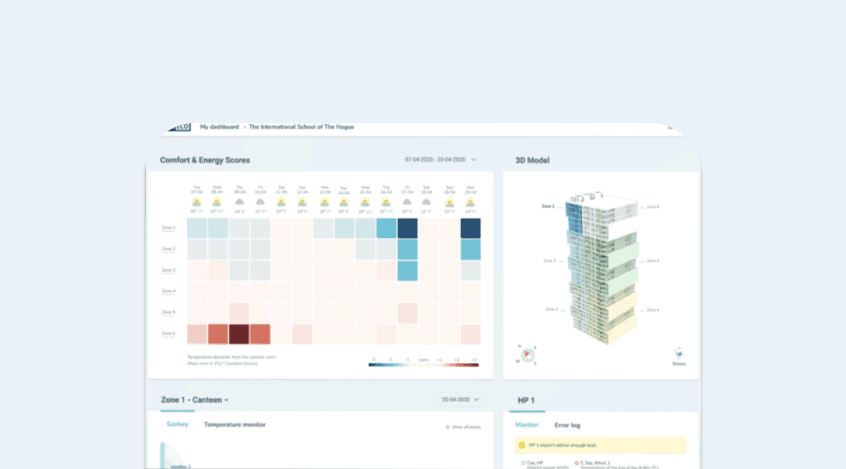Predicting energy need with data and AI
Client
Period

Description
I contributed to the development of the Eco Building Dashboard, an Angular application that provides real-time insights into building performance. The dashboard uses AI-driven forecasts based on a digital twin of the building to provide building managers with information about their building's performance. As the lead front-end developer on the project, I coached 3 other developers and contributed to the integration and visualization of data from various sources, including weather forecasts, thermal changes and building usage to predict and minimize the buildings’ energy needs. This was accomplished over a period of six months through the use of Scrum sprints, which allowed us to deliver a high-quality product on time, within budget and fully integrated with the internal Design System.
Business and user outcome
The Eco Building Dashboard contributed significantly to both the business and user outcomes of the project. For building managers (the end users), the dashboard provided real-time insights into building performance, allowing them to optimise their building's energy usage and reduce costs. For the business, the dashboard demonstrated the company's commitment to sustainability and innovation, positioning them as a leader in the industry. The AI-driven forecasting techniques used in the dashboard also showcased the company's technical capabilities and potential for future growth.
Biggest Challenge
Due to the complex nature the topic, one of the biggest challenges of this project was bridging the gap between the business needs of the product owner and the technical implementation. As the lead developer, I played a key role in translating business requirements into feasible technical tasks for the development team.
What I've Learned
Through this project, I gained more experience in enterprise level Angular development, real-time data visualisation using the D3 library, and AI-driven forecasting techniques. I also improved my ability to collaborate with the product owner and translate business needs into technical implementation. In addition, we used various API’s to gather the necessary data and NgRx to manage the state of the application. This allowed for more efficient data handling and state management, ultimately resulting in a more scalable and maintainable application.
Hard Skills
- Angular
- Typescript
- NgRx
- Azure DevOps
- Real-time data visualization with D3
Soft Skills
- Adaptability: The ability to adjust changing project requirements and priorities.
- Empathy: The ability to understand and relate to the needs and perspectives of stakeholders, including clients, team members, and end-users.
- Leadership: The ability to inspire and motivate others, set clear goals and expectations, and delegate tasks effectively.
- Creativity: The ability to generate innovative ideas and solutions, and think outside the box to overcome challenges within the business restrictions.
- Critical thinking: The ability to analyze complex problems, evaluate different options, and make informed decisions.